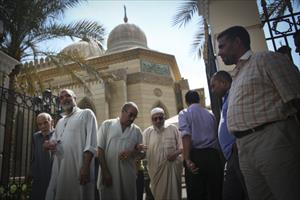(Ahlul Bayt News Agency) - One recent Friday, Egyptian officials dispatched an Islamic preacher named Mustafa Nawareg to a mosque full of angry people — distraught relatives and friends of demonstrators killed by security forces.It was a crowd used to hearing fiery sermons that called the dead “martyrs” and exhorted followers to take to the streets. But now the crowd would hear from Nawareg, who was sent there by the government to “correct the fallacies of extremist thought.”It took about five minutes for the shoes to start flying.“Who paid you to say this?” yelled one man, according to Nawareg and others at El-Rahman El-Rahim mosque that day.“Come down from your stage, you infidel!” yelled another as the crowd surged toward Nawareg. He felt hands clasp his neck before he managed to escape.Nawareg’s sermon was part of a campaign by Egypt’s military-backed government to “standardize religious discourse” and promote what authorities describe as the true “Egyptian Islam.”But critics say the effort could add fuel to a violent backlash that has included a suicide bombing in the heart of Cairo and regular attacks on security forces in the Sinai Peninsula.Although the government’s initiative promotes a separation between Islam and politics, opponents say that the new push serves the decidedly political purpose of casting a divine glow on the brutal crackdown against supporters of ousted president Mohamed Morsi. Hundreds of Morsi’s backers in the Muslim Brotherhood have been killed and thousands arrested by authorities, who describe them as “terrorists.”“This is the new regime trying to create an official Islam, a state Islam, which doesn’t exist within the Islamic tradition,” said Emad Shahin, a professor of public policy at the American University in Cairo. “It’s providing a religious justification to tolerate the killing of possibly thousands of people, and it is sending alarming signals into many segments of society. This is exactly what you call fascism.”Pop culture is taking the cue, Shahin noted, pointing to a new song being played around Cairo. It is called “We Are a People, and You Are a Different People,” a thinly veiled reference to Morsi’s followers.“We have a God, and you have a different God,” the lyrics go. “Because Egypt is in our blood, we will never be like you, and you will never be like us. . . . Take your yelling and your screaming and your fatwas and go far away from our land.”So far, the Ministry of Endowments, which regulates mosques, has effectively disqualified tens of thousands of preachers in the country, imams known for urging a more Islamist political order and, lately, for rallying followers to protest the July 3 coup that ousted the democratically elected Morsi.In their place, the ministry has mandated that all preachers be government-certified graduates of Cairo’s al-Azhar University, the world’s preeminent institution of moderate Sunni learning. Al-Azhar has also been closely associated with a string of Egyptian autocrats.The goal, officials said, is to promote an “Azhari paradigm” of Islam, which they describe as an “Egyptian notion of religiosity” that tolerates no explicit talk of politics while encouraging respect for government institutions, including the military.“It is balanced, open, respectful of traditions and very aware of current changes in reality,” said Ibrahim Negm, a senior adviser at al-Azhar. “We want to return religion to its rightful place, as a forum of spiritual guidance, not as a forum of political debate.”Penalties for those who violate the new rules are under discussion. Negm and others bluntly defend the curbing of religious freedom as necessary, given the 21/2 turbulent years since the uprising that toppled longtime autocrat Hosni Mubarak.“In normal societies where you have 100 percent literacy, you can implement democratic values,” Negm said. “In Egypt, it’s very risky to leave things as they are because experiments have made us realize — too late — that not regulating the religious landscape leads to violence and terror.”A long struggle over IslamThe struggle to define Islam in Egypt has a long history, one pitting the Muslim Brotherhood and other dissidents who favor political Islam against the more secularly oriented establishment.Egyptian President Gamal Abdel Nasser established the Ministry of Endowments in the 1950s, around the time that he survived an assassination attempt by a Brotherhood member and banned the organization.All his successors launched periodic crackdowns on Islamist preachers, though the wider goal of stifling their ideas inevitably failed in a country with more than 100,000 mosques and millions drawn to sermons promising a more perfect Islamic society./149
source : washingtonpost
Sunday
13 October 2013
8:30:00 PM
472277

So far, the Ministry of Endowments, which regulates mosques, has effectively disqualified tens of thousands of preachers in the country, imams known for urging a more Islamist political order and, lately, for rallying followers to protest the July 3 coup that ousted the democratically elected Morsi.
